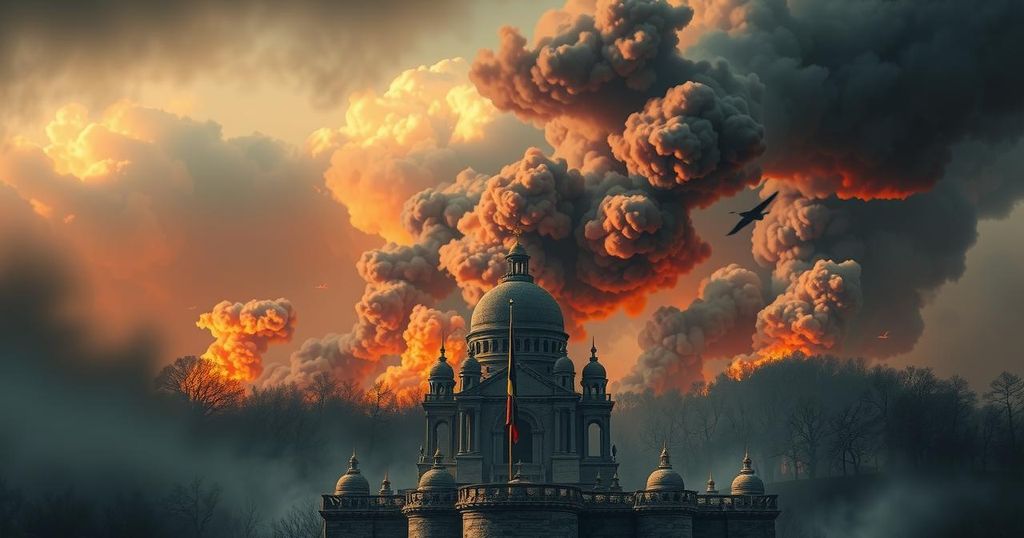U.S. Launches Airstrikes Against Iranian Nuclear Sites; Trump Calls for Peace
The U.S. bombed three nuclear sites in Iran Saturday, following intense military actions from Israel. President Trump demanded Iran’s unconditional surrender, asserting a commitment to peace but maintaining aggressive military posturing. Concurrently, Tehran’s leadership dismissed U.S. threats, fueling the ongoing conflict. Tensions escalate as Israel and Iran continue to exchange strikes, with the potential for broader regional implications.
In a significant escalation of military action, the United States military executed airstrikes against three nuclear sites in Iran on Saturday night. This follows President Trump’s urgent calls for Iran to surrender, ramping up the pressure after Israel’s recent assaults on Iranian military and nuclear infrastructure. Trump announced the operations on Truth Social, confirming that all aircraft involved returned safely to base shortly after deploying bombs primarily targeting the Fordow facility, along with sites in Natanz and Esfahan.
The President expressed his satisfaction with the mission’s success, stating, “A full payload of BOMBS was dropped on the primary site, Fordow. Congratulations to our great American Warriors. There is not another military in the World that could have done this. NOW IS THE TIME FOR PEACE!” Trump’s comments come after days of deliberation during which he weighed an approach toward negotiating with Iran against military intervention.
In a bold move, Trump demanded Iran’s “unconditional surrender,” while also urging Israeli Prime Minister Benjamin Netanyahu to maintain military pressure on Iran. This comes as Israel has already begun its offensive against Iran, targeting prominent nuclear scientists linked to the country’s nuclear enrichment efforts. In response to ongoing tensions, Trump threatened a decisive end to the conflict unless Iran yields its nuclear ambitions.
The situation intensified further when Trump revealed that U.S. intelligence has pinpointed the location of Iranian Supreme Leader Ayatollah Ali Khamenei. He stated, however, that Khamenei is being spared for the time being. Khamenei’s public response dismissed Trump’s demands as ludicrous, reiterating Iran’s unwavering position against capitulation.
“Let’s not forget, we will never surrender in response to the attacks of anyone,” Khamenei asserted through a spokesperson, emphasizing the futility of U.S. threats. Trump reacted by wishing the ayatollah “good luck,” indicating his confidence in U.S. strength in the conflict.
Additionally, Israel has urged the U.S. to utilize its military capabilities to effectively target the heavily fortified Fordow facility, citing the advanced technology available that would make demolishing such underground sites more feasible compared to traditional bombing.
While considering options, Trump acknowledged the possibility of a diplomatic meeting with Iranian representatives who had reached out for talks. However, he noted that the current situation, due to escalated combat, makes it challenging for Iranian officials to leave their country. This adds a layer of complexity to the crisis, already marked by mutual strikes.
As retaliations unfolded, the Israeli Air Force launched further airstrikes in Iran’s west, prompting missile responses from Tehran. The Israeli Defense Forces have reiterated their commitment to prevent Iranian forces from restoring any military capabilities. Notably, Russian President Vladimir Putin has offered to mediate, however, Trump has rejected this intervention.
Anticipating upcoming actions, Yechiel Leiter, Israel’s ambassador to the U.S., hinted at surprising developments, suggesting these moves would overshadow past conflicts. “You’re going to see some surprises on Thursday night and Friday that will make the beeper operation almost seem simple,” he declared, escalating the atmosphere of uncertainty surrounding the region.
The U.S. military’s airstrikes against Iranian nuclear sites mark a pivotal moment in escalating tension between the two nations. President Trump’s staunch stance for Iran’s unconditional surrender and his support for Israel’s operations could redefine the regional power dynamics. Khamenei’s firm rejection of these demands signals a likelihood of continued conflict unless diplomatic efforts materialize. Such developments underscore the fragile nature of peace in the Middle East.
Original Source: nypost.com




Post Comment